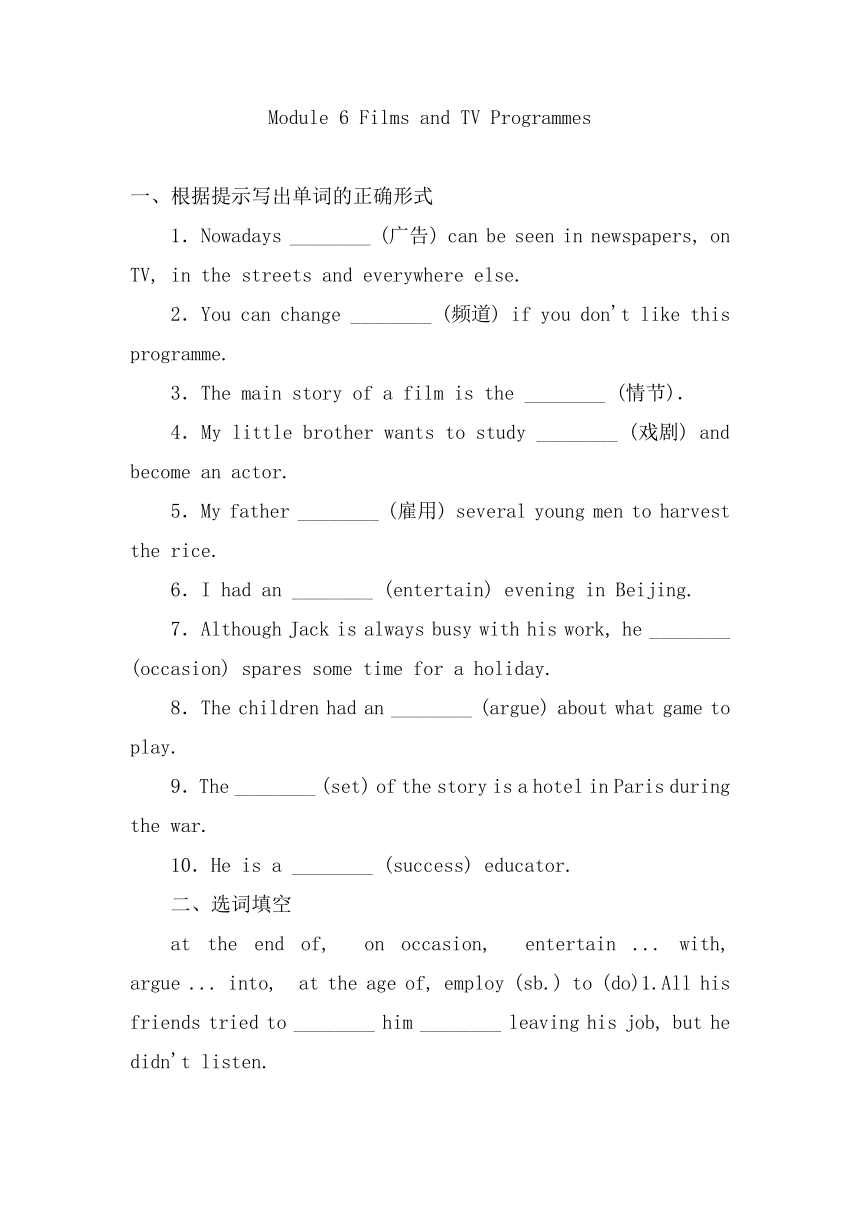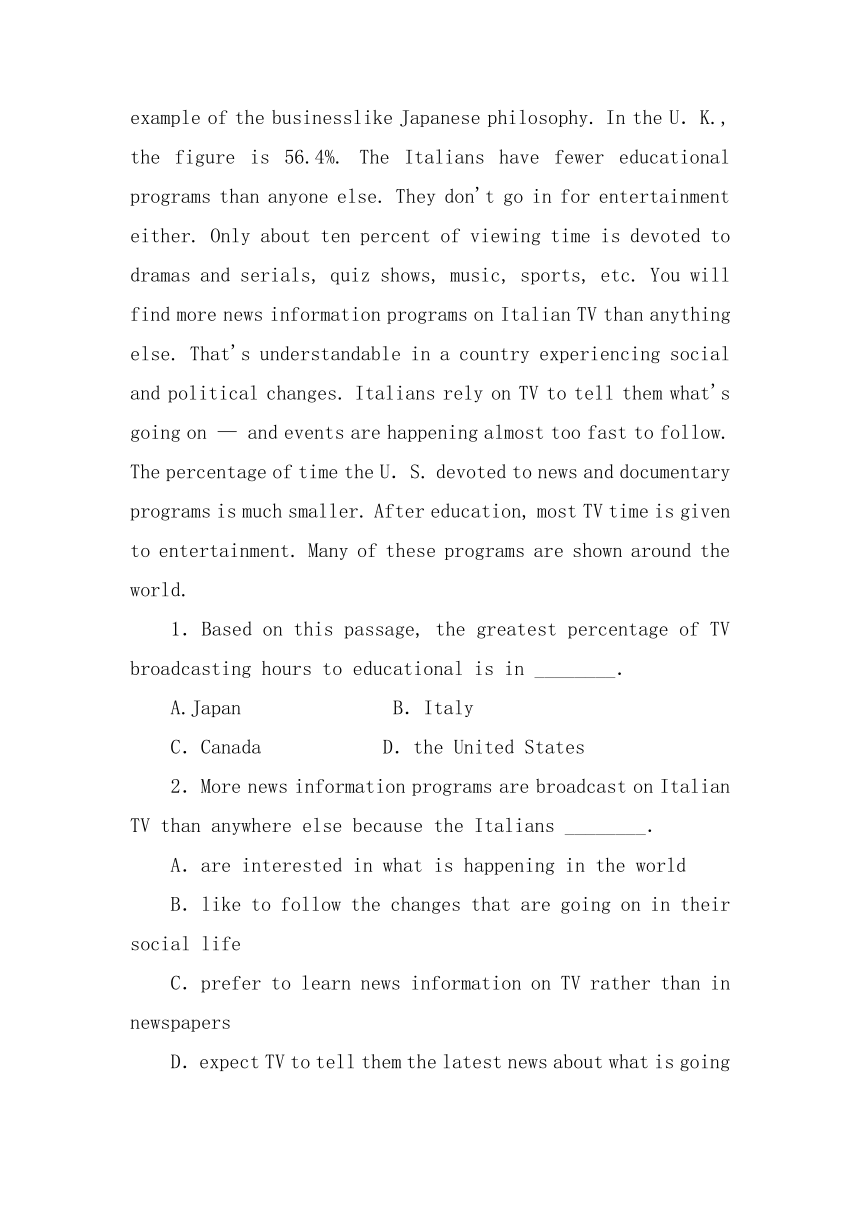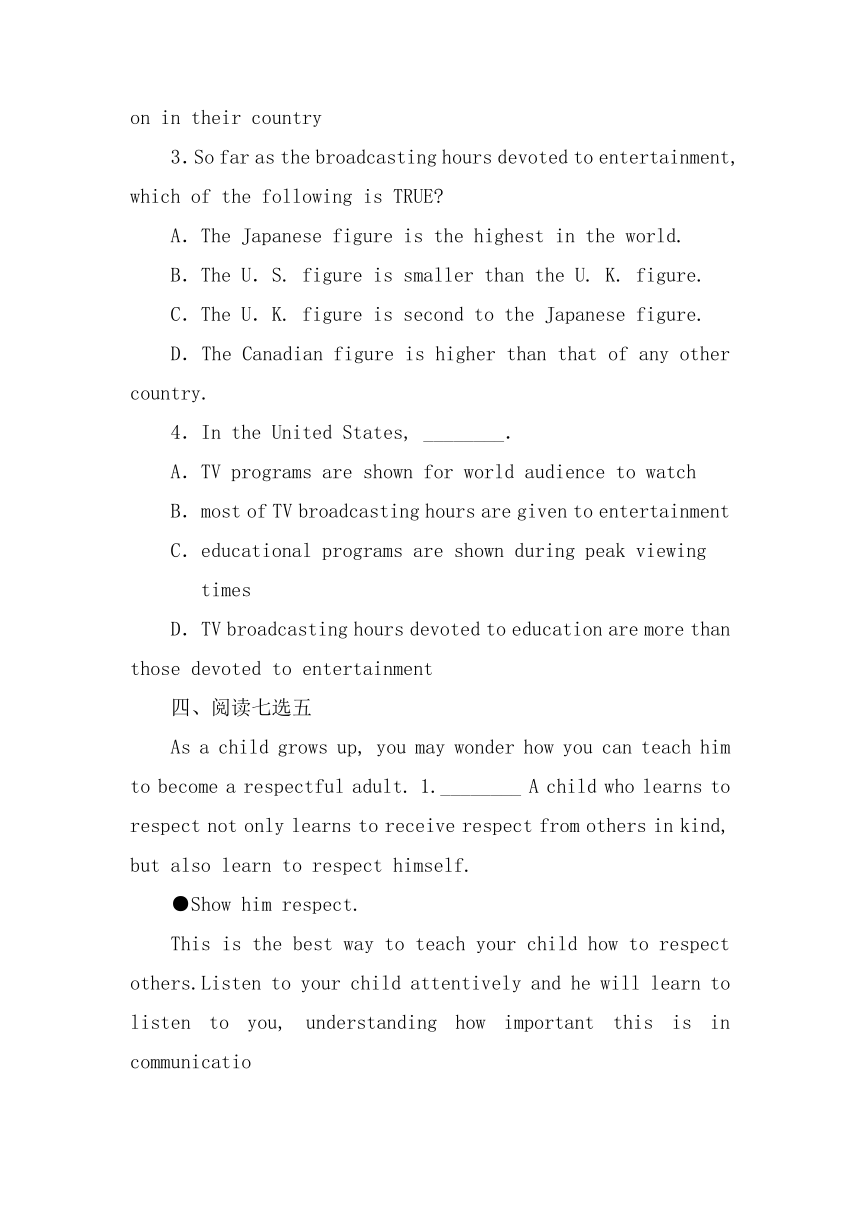外研版必修二:Module 6 Films and TV Programmes 强化提升练习(含答案)
文档属性
| 名称 | 外研版必修二:Module 6 Films and TV Programmes 强化提升练习(含答案) |

|
|
| 格式 | docx | ||
| 文件大小 | 17.8KB | ||
| 资源类型 | 教案 | ||
| 版本资源 | 外研版 | ||
| 科目 | 英语 | ||
| 更新时间 | 2021-12-01 00:00:00 | ||
图片预览




文档简介
Module 6 Films and TV Programmes
一、根据提示写出单词的正确形式
1.Nowadays ________ (广告) can be seen in newspapers, on TV, in the streets and everywhere else.
2.You can change ________ (频道) if you don't like this programme.
3.The main story of a film is the ________ (情节).
4.My little brother wants to study ________ (戏剧) and become an actor.
5.My father ________ (雇用) several young men to harvest the rice.
6.I had an ________ (entertain) evening in Beijing.
7.Although Jack is always busy with his work, he ________ (occasion) spares some time for a holiday.
8.The children had an ________ (argue) about what game to play.
9.The ________ (set) of the story is a hotel in Paris during the war.
10.He is a ________ (success) educator.
二、选词填空
at the end of, on occasion, entertain ... with, argue ... into, at the age of, employ (sb.) to (do)1.All his friends tried to ________ him ________ leaving his job, but he didn't listen.
2.The child ________ himself ________ his building block.
3.I only see them in the store ____________, but they are available online as well.
4.Why do these trains always leave ____________ the day
5.Kimi joined in the programme Where Are We Going, Dad ____________ 4, making him very famous.
6.They ________ some laborers ________ pick the fruit yesterday.
6.employed; to
三、阅读理解
阅读理解
A
When the TV viewer turns on his set, what sort of programs does he have to choose from You might think there would be more programs devoted to entertainment than to anything else, but that's not the case. In most countries, fewer than 20% of broadcasting hours are devoted to entertainment. U.S. figures are high — 34.8%, and the unloving Canadians are even higher with 44%. Except Canada and Italy, all countries give more broadcasting time to education than to either information (news, documentaries and so on) or entertainment programs. Of course, few educational broadcasts take place during peak viewing times. In Japan though, more than 60% of broadcasting time is taken up with education of one kind of another — just another example of the businesslike Japanese philosophy. In the U.K., the figure is 56.4%. The Italians have fewer educational programs than anyone else. They don't go in for entertainment either. Only about ten percent of viewing time is devoted to dramas and serials, quiz shows, music, sports, etc. You will find more news information programs on Italian TV than anything else. That's understandable in a country experiencing social and political changes. Italians rely on TV to tell them what's going on — and events are happening almost too fast to follow. The percentage of time the U.S. devoted to news and documentary programs is much smaller. After education, most TV time is given to entertainment. Many of these programs are shown around the world.
1.Based on this passage, the greatest percentage of TV broadcasting hours to educational is in ________.
A.Japan B.Italy
C.Canada D.the United States
2.More news information programs are broadcast on Italian TV than anywhere else because the Italians ________.
A.are interested in what is happening in the world
B.like to follow the changes that are going on in their social life
C.prefer to learn news information on TV rather than in newspapers
D.expect TV to tell them the latest news about what is going on in their country
3.So far as the broadcasting hours devoted to entertainment, which of the following is TRUE
A.The Japanese figure is the highest in the world.
B.The U.S. figure is smaller than the U. K. figure.
C.The U.K. figure is second to the Japanese figure.
D.The Canadian figure is higher than that of any other country.
4.In the United States, ________.
A.TV programs are shown for world audience to watch
B.most of TV broadcasting hours are given to entertainment
C.educational programs are shown during peak viewing
times
D.TV broadcasting hours devoted to education are more than those devoted to entertainment
四、阅读七选五
As a child grows up, you may wonder how you can teach him to become a respectful adult. 1.________ A child who learns to respect not only learns to receive respect from others in kind, but also learn to respect himself.
●Show him respect.
This is the best way to teach your child how to respect others.Listen to your child attentively and he will learn to listen to you, understanding how important this is in communicatio
●2.________
The more you say“please”and“thank you”to your child, the more likely he will learn to use them.Politeness then becomes a normal part of any conversation.
●Agree to disagree.
3.________ Explain your decision so that he will understand you and expect respectful responses.Disagreeing with you doesn't necessarily mean disobedience (不顺从).
●Control your impulse to overreact.
When a situation arises (出现), stay calm and keep in mind that you are supposed to be modeling correct behavior. 4.________
●Praise, praise, praise.
So much is focused on what a child does wrong and how to correct it that his accomplishments (成绩) are not celebrated enough. 5.________
A.Teach manners by using polite requests and responses.
B.Try to remember that a child won't always agree with you.
C.Respect is necessary for a meaningful and successful life.
D.If he sees you lose your temper, he is more likely to respond that way in future.
E.A child may act as he pleases, and he will live a happy life.
F.Seeing a child exhibit respectful behavior, make sure he knows how proud you are of him.
G.Respectful behavior is always accompanied by bad behavior as a child.
一、根据提示写出单词的正确形式
1.ads
2.channel
3.plot
4.drama
5.employed
6.entertaining
7.occasionally
8.argument
9.setting
10.successful
二、选词填空
1.argue; into
2.entertained; with
3.on occasion
4.at the end of
5.at the age of
三、阅读理解
1.A 细节理解题。根据文章第七句中“In Japan though, more than 60% of broadcasting time is taken up with education of one kind of another”说明在日本教育方面的节目时间最长,故A正确。
2.D 细节理解题。根据文章倒数第四句“Italians rely on TV to tell them what’s going on — and events are happening almost too fast to follow.”说明意大利人依赖电视来告诉他们世界上所发生的事情。
3.D 细节理解题。根据文章第四句中“the unloving Canadians are even higher with 44%”说明在加拿大,娱乐类的节目时间最长。
4.D 细节理解题。根据文章第五句中“all countries give more broadcasting time to education than to either information (news, documentaries and so on) or entertainment programs”说明D正确。
四、阅读七选五
1.C 考查对上下文的理解和推理判断能力。上句:随着孩子长大,你可能想知道怎样使孩子变成尊敬的有礼貌的人。C项:尊敬对于成功的有意义的人生是非常必要的。与上句连接,故选C。
2.A D考查对上下文的理解和推理判断能力。本段在讲礼貌问题,要耳濡目染教育孩子有礼貌。A项:通过礼貌的请求和回应教给孩子礼貌,概括了全段意思,故选A。
3.B 考查对上下文的理解和推理判断能力。本段主要讲和孩子意见一致或不一致及解决办法。B项在讲这个问题,故选B。
4.D 考查对上下文的理解和推理判断能力。本段主要讲克服冲动和过激行为,D项讲你冲动对孩子的影响,符合本段文意,故选D。
5.F 考查对上下文的理解和推理判断能力。最后一段讲要对孩子多表扬,F项:看到孩子表现好了要让他知道你为此多么骄傲。符合本段意思,故选F。
一、根据提示写出单词的正确形式
1.Nowadays ________ (广告) can be seen in newspapers, on TV, in the streets and everywhere else.
2.You can change ________ (频道) if you don't like this programme.
3.The main story of a film is the ________ (情节).
4.My little brother wants to study ________ (戏剧) and become an actor.
5.My father ________ (雇用) several young men to harvest the rice.
6.I had an ________ (entertain) evening in Beijing.
7.Although Jack is always busy with his work, he ________ (occasion) spares some time for a holiday.
8.The children had an ________ (argue) about what game to play.
9.The ________ (set) of the story is a hotel in Paris during the war.
10.He is a ________ (success) educator.
二、选词填空
at the end of, on occasion, entertain ... with, argue ... into, at the age of, employ (sb.) to (do)1.All his friends tried to ________ him ________ leaving his job, but he didn't listen.
2.The child ________ himself ________ his building block.
3.I only see them in the store ____________, but they are available online as well.
4.Why do these trains always leave ____________ the day
5.Kimi joined in the programme Where Are We Going, Dad ____________ 4, making him very famous.
6.They ________ some laborers ________ pick the fruit yesterday.
6.employed; to
三、阅读理解
阅读理解
A
When the TV viewer turns on his set, what sort of programs does he have to choose from You might think there would be more programs devoted to entertainment than to anything else, but that's not the case. In most countries, fewer than 20% of broadcasting hours are devoted to entertainment. U.S. figures are high — 34.8%, and the unloving Canadians are even higher with 44%. Except Canada and Italy, all countries give more broadcasting time to education than to either information (news, documentaries and so on) or entertainment programs. Of course, few educational broadcasts take place during peak viewing times. In Japan though, more than 60% of broadcasting time is taken up with education of one kind of another — just another example of the businesslike Japanese philosophy. In the U.K., the figure is 56.4%. The Italians have fewer educational programs than anyone else. They don't go in for entertainment either. Only about ten percent of viewing time is devoted to dramas and serials, quiz shows, music, sports, etc. You will find more news information programs on Italian TV than anything else. That's understandable in a country experiencing social and political changes. Italians rely on TV to tell them what's going on — and events are happening almost too fast to follow. The percentage of time the U.S. devoted to news and documentary programs is much smaller. After education, most TV time is given to entertainment. Many of these programs are shown around the world.
1.Based on this passage, the greatest percentage of TV broadcasting hours to educational is in ________.
A.Japan B.Italy
C.Canada D.the United States
2.More news information programs are broadcast on Italian TV than anywhere else because the Italians ________.
A.are interested in what is happening in the world
B.like to follow the changes that are going on in their social life
C.prefer to learn news information on TV rather than in newspapers
D.expect TV to tell them the latest news about what is going on in their country
3.So far as the broadcasting hours devoted to entertainment, which of the following is TRUE
A.The Japanese figure is the highest in the world.
B.The U.S. figure is smaller than the U. K. figure.
C.The U.K. figure is second to the Japanese figure.
D.The Canadian figure is higher than that of any other country.
4.In the United States, ________.
A.TV programs are shown for world audience to watch
B.most of TV broadcasting hours are given to entertainment
C.educational programs are shown during peak viewing
times
D.TV broadcasting hours devoted to education are more than those devoted to entertainment
四、阅读七选五
As a child grows up, you may wonder how you can teach him to become a respectful adult. 1.________ A child who learns to respect not only learns to receive respect from others in kind, but also learn to respect himself.
●Show him respect.
This is the best way to teach your child how to respect others.Listen to your child attentively and he will learn to listen to you, understanding how important this is in communicatio
●2.________
The more you say“please”and“thank you”to your child, the more likely he will learn to use them.Politeness then becomes a normal part of any conversation.
●Agree to disagree.
3.________ Explain your decision so that he will understand you and expect respectful responses.Disagreeing with you doesn't necessarily mean disobedience (不顺从).
●Control your impulse to overreact.
When a situation arises (出现), stay calm and keep in mind that you are supposed to be modeling correct behavior. 4.________
●Praise, praise, praise.
So much is focused on what a child does wrong and how to correct it that his accomplishments (成绩) are not celebrated enough. 5.________
A.Teach manners by using polite requests and responses.
B.Try to remember that a child won't always agree with you.
C.Respect is necessary for a meaningful and successful life.
D.If he sees you lose your temper, he is more likely to respond that way in future.
E.A child may act as he pleases, and he will live a happy life.
F.Seeing a child exhibit respectful behavior, make sure he knows how proud you are of him.
G.Respectful behavior is always accompanied by bad behavior as a child.
一、根据提示写出单词的正确形式
1.ads
2.channel
3.plot
4.drama
5.employed
6.entertaining
7.occasionally
8.argument
9.setting
10.successful
二、选词填空
1.argue; into
2.entertained; with
3.on occasion
4.at the end of
5.at the age of
三、阅读理解
1.A 细节理解题。根据文章第七句中“In Japan though, more than 60% of broadcasting time is taken up with education of one kind of another”说明在日本教育方面的节目时间最长,故A正确。
2.D 细节理解题。根据文章倒数第四句“Italians rely on TV to tell them what’s going on — and events are happening almost too fast to follow.”说明意大利人依赖电视来告诉他们世界上所发生的事情。
3.D 细节理解题。根据文章第四句中“the unloving Canadians are even higher with 44%”说明在加拿大,娱乐类的节目时间最长。
4.D 细节理解题。根据文章第五句中“all countries give more broadcasting time to education than to either information (news, documentaries and so on) or entertainment programs”说明D正确。
四、阅读七选五
1.C 考查对上下文的理解和推理判断能力。上句:随着孩子长大,你可能想知道怎样使孩子变成尊敬的有礼貌的人。C项:尊敬对于成功的有意义的人生是非常必要的。与上句连接,故选C。
2.A D考查对上下文的理解和推理判断能力。本段在讲礼貌问题,要耳濡目染教育孩子有礼貌。A项:通过礼貌的请求和回应教给孩子礼貌,概括了全段意思,故选A。
3.B 考查对上下文的理解和推理判断能力。本段主要讲和孩子意见一致或不一致及解决办法。B项在讲这个问题,故选B。
4.D 考查对上下文的理解和推理判断能力。本段主要讲克服冲动和过激行为,D项讲你冲动对孩子的影响,符合本段文意,故选D。
5.F 考查对上下文的理解和推理判断能力。最后一段讲要对孩子多表扬,F项:看到孩子表现好了要让他知道你为此多么骄傲。符合本段意思,故选F。
